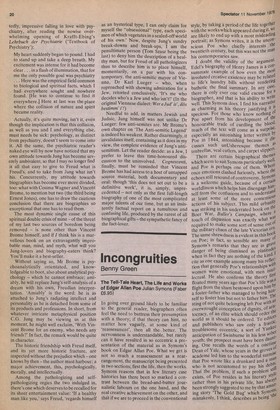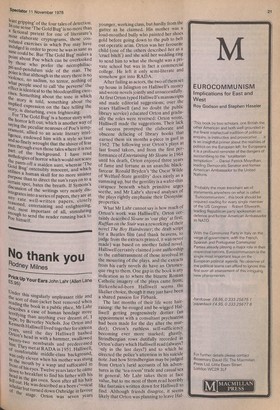Incongruities
Benny Green
The Tell-Tale Heart, The Life and Works of Edgar Allan Poe Julian Symons (Faber E6.95) In going over ground likely to be familiar to the general reader, biographers often feel the need to buttress their presumption with a theory; if that theory can hint, no matter how vaguely, at some kind of 'reassessment', then all the better. The nervousness is understandable, but rarely can it have resulted in so eccentric a presentation of the material as in Symons's book on Edgar Allan Poe. What we get is not so much a reassessment as a rearrangement, the manuscript being presented in two sections; first the life, then the works. Symons reasons that in few literary case histories has there been so marked a contrast between the bread-and-butter journalistic labours on the one hand, and the real creative achievement on the other, and that if we are to proceed in the conventional style, by taking a period of the life together with the works which appeared during it, vie are likely to end up with a most misleading portrait; as Symons writes, it is the unconscious Poe who chiefly interests the twentieth century, but this was not the man his contemporaries saw. I doubt the validity of the argument. Edel's biography of Henry James is a con' summate example of how even the most involuted creative existence may be related to life's laundry bills without rendering bathetic the final summary. In any case, there is only ever one valid excuse for a biographer, and that is his ability to write well. This Symons does. I find his narrative as charming as his theory justifying it specious. For those who know nothing c" Poe apart from his development of the honourable trade of curdling the blood, much of the text will come as a surprise, especially an astonishing letter written bY poe in 1844, astonishing because it dis" cusses such unUsheresque themes as umbrellas, veal cutlers, and carpet slipPers' There are certain biographical themes which seem to suit Symons particularly Well' and Poe is perhaps one of them. Where once emotions clashed furiously, where the echoes still resound of controversy, Sym°13.5 is a welcome guide, because of a certain worldliness which helps him disengage hill!, self from the confusions and to understanu at least some of the more contentions actions of his subject. This mild urbanitY was striking in his underrated book on the Boer War, Btdler's Campaign, where II touch of dispassion was exactly what WI required to make some sort of sense the military chaos of the late Victorian era: The same shrewdness is evident in this boox, on Poe; in fact, so sensible are manY °I Symons's remarks that they are in grave danger of being dismissed as platitudes, when in fact they are nothing of the kind' cite as one example among many his reileci, tion that generally Poe's relationships NOT women were emotional, with men inte lectual. He also confirms the theory firs. floated many years ago that Poe's life flight from the sham bestowed upon hillt._,13/ a foster-father who managed to bring hI self to foster him but not to father him. 1."0 sting of not quite belonging left Poe with t overwrought conception of dignity, of arP: tocracy, of an elite which should order th` world as it should be ordered. To editors and publishers who saw only a franfrtiee' troublesome eccentric, a sort of Yalltr anticipation of Swinburne in his less youth; the prospect must have been datill'e ing. One recalls the words of a onetinif Dean of Yale, whose years in the groves,° academe led him to the wonderful swirl', that Poe wrote like a drunkard and a who is not accustomed to pay his debt!' That the problem, if such a problem st" tvle exists, of Poe resides in his literary s-J., rather than in his private life, has alwa.,,,r been strongly suggested to me by that arnIvi ing story 'The Gold Bug' which °5' mistakenly, I think, describes as being `11'" least gripping' of the four tales of detection. In one sense 'The Gold Bug' is no more than a fictional pretext for one of literature's most elaborate cryptograms, those conyoluted exercises in which Poe may have Indulged in order to prove he was as sane as sane could be. But 'The Gold Bug' makes a Point about Poe which can be overlooked by those who prefer the necrophiliacpit:and-pendulum side of the man. The Point is that although in the story there is no violence, no sadism, no terror, nothing of What People used to call 'the perverse' the effect is identical to the bloodcurdling exercises. Something about the tone in which the story is told, something about the implied expression on the face telling the story, is disturbing, even frightening. For 'The Gold Bug' is a horror story with the horror left out,awhich is another way of saying the peculiar neuroses of Poe's temperament, allied to an acute literary intelligence, endowed him with a style so taut and so finely wrought that the shiver of fear runs through even those tales where it is not Part of the background. I have read anthologies of horror which would not scare he pants off a maiden aunt, whereas 'The Gold Bug' ostensibly innocent, and which Utilises a human skull for no more sinister purpose than to direct the sun's rays on to a cdertain spot, bates the breath. If Symon iscussion of the writings very nearly dm s,s integrates into a series of papers, they are at any rate well-written papers, closely reasoned, entertaining and enlightening, and, most important of all, stimulating enough to send the reader running back to Icloe himself.
4111111111.1mmui



































 Previous page
Previous page